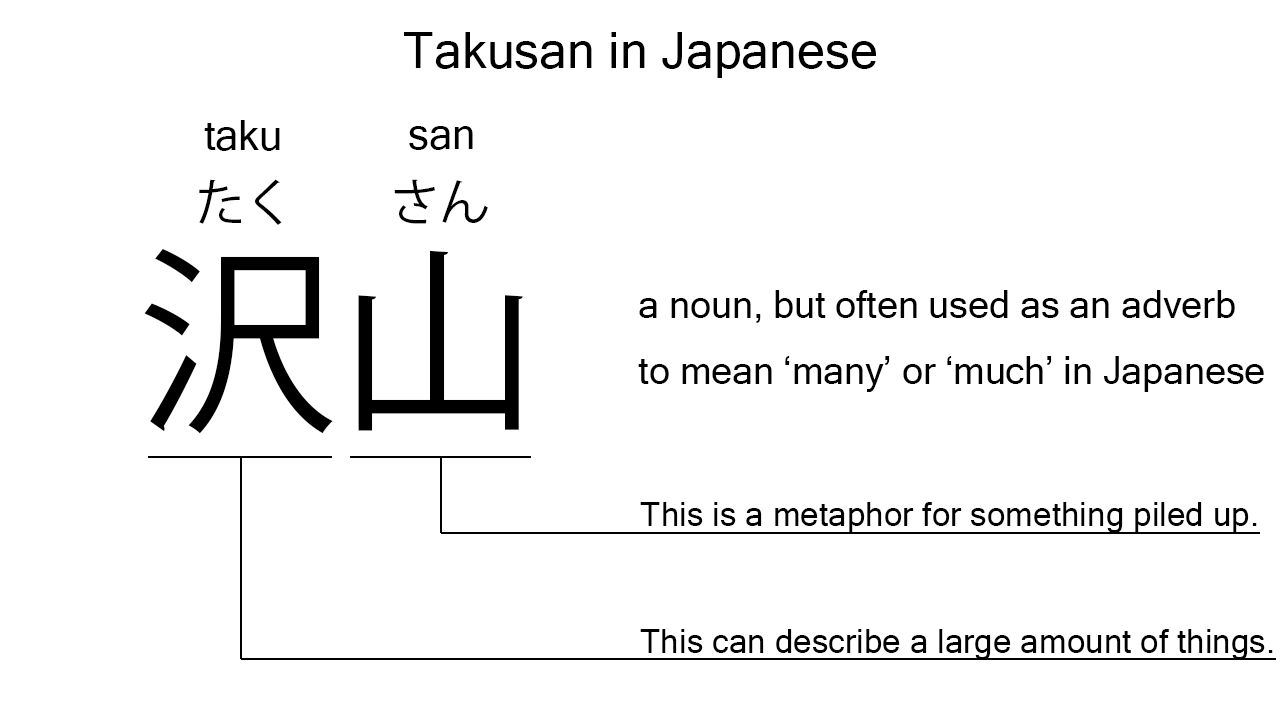What does “takusan” mean in Japanese?
Grammatically “takusan” is not really an adverb, but native speakers use it quite often as an adverb of quantity to mean ‘many’, ‘much’, or such in Japanese. Usually it is written in hiragana, but in this blog post I will explain it in detail based on its kanji expression. And also, I will explain how to use it through example sentences. My explanations would help Japanese learners better understand this adverb of quantity more clearly. Then, let’s get started!
Contents
Definition and meanings of “takusan”
Let me start with the definition and meanings of “takusan”.
- takusan – 沢山 (たくさん) : a noun, but quite often used as an adverb of quantity to mean ‘many’, ‘much’, or such in Japanese.
Japanese native speakers use this word to describe a large number of things or a large amount of things. So, the usage is very similar to those of “many”, “much”, and the like in English.
Japanese native speakers usually write this word in hiragana, but it has the kanji expression. To understand this word more clearly, let me explain its kanji characters in detail, one by one.
What does “takusan” literally mean in Japanese?
The kanji expression of “takusan” consists of the following two kanji characters:
- 沢 : a kanji character used to describe a large number of things or a large amount of things in the old Japanese language.
- 山 : a kanji character used to mean ‘mountain‘. This can also work as a metaphor for something piled up high.
From these two kanji characters, we can understand that “takusan” literally describes something piled up very high. This literal interpretation is still very close to the actual usages, I think.

When we meet new kanji expressions, we should check their kanji characters in detail to understand their meanings clearly and deeply. In many cases, kanji characters tell us a lot about the meanings of the expressions they form. Actually, here, we could get the better understanding of “takusan” through the detailed kanji check above.
So far, I’ve explained the definition and meanings of “takusan” together with its kanji characters. Then, let me explain how to use it through the example sentences below.
Example #1: how to use “takusan”
kanojo wa ryokou ni takusan okane wo tsukau – 彼女は旅行にたくさんお金を使う (かのじょはりょこうにたくさんおかねをつかう)
She spends much money on traveling.
Below are the new words used in the example sentence.
- kanojo – 彼女 (かのじょ) : a pronoun meaning ‘she’ in Japanese.
- wa – は : a binding particle working as a case marker or topic marker. In the example, this works after “kanojo” to make the subject in the sentence.
- ryokou – 旅行 (りょこう) : a noun meaning ‘travel’ in Japanese.
- ni – に : a case particle used to say to which object an action is directed. In the example, this is used after “ryokou” to indicate the object on which she spends much money.
- okane – お金 (おかね) : a noun meaning ‘money’ in Japanese.
- wo – を : a case particle used to make the object word in a sentence. In the example, this is used after “okane” to make the object in the sentence.
- tsukau – 使う (つかう) : a verb meaning ‘to use’ in Japanese. In the example, this works together with “okane” to mean ‘to spend money’ in Japanese.
This is a typical usage of “takusan”. In this example, it works in front of the noun “okane” to describe its large amount. So, its usage is very similar to that of “much” in English.
Example #2: another usage of “takusan”
As I explained above, “takusan” basically means ‘many’, ‘much’, or such in Japanese. When it is used with a negative nuance, however, it can also mean ‘enough’, ‘sufficient’, ‘no more’, or such in Japanese. Let me explain this usage through the example sentence below.
iiwake wa takusan desu – 言い訳はたくさんです (いいわけはたくさんです)
No more excuses!
Below are the new words used in the example sentence.
- iiwake – 言い訳 (いいわけ) : a noun meaning ‘excuse’, ‘apology’, or such in Japanese. This can also work as a plural noun. Learn more about Japanese plural.
- desu – です : an auxiliary verb used after a noun or adjective to make it polite. Probably, this is well known as a part of Japanese desu form. In the example, this is used after “takusan” to make it sound polite.
This is another typical usage of “takusan”. Like in this example, it can work with a negative nuance to mean ‘no more’ in Japanese. It’s worth knowing, I think.
Summary
In this blog post, I’ve explained the definition and meanings of “takusan” in detail based on its kanji expression. And also, I’ve explained how to use it through the example sentences. Let me summarize them as follows.
- takusan – 沢山 (たくさん) : a noun, but quite often used as an adverb of quantity to mean ‘many’, ‘much’, or such in Japanese. Japanese native speakers use this word to describe a large number of things or a large amount of things. Usually this is written in hiragana, but the kanji expression is still in line with the actual meanings: these two kanji characters describe something piled up very high. When this is used with a negative nuance, this can also mean ‘enough’, ‘sufficient’, ‘no more’, or such in Japanese.
Hope my explanations are understandable and helpful for Japanese learners.